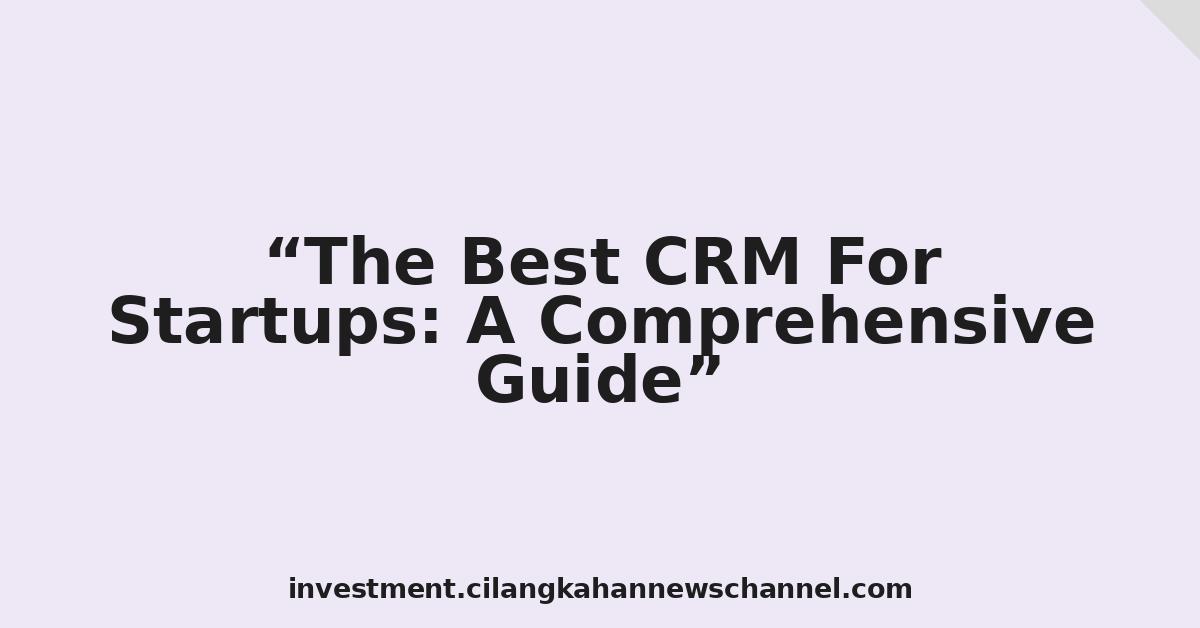Choosing the right Customer Relationship Management (CRM) system is crucial for any startup. A well-implemented CRM can streamline operations, improve customer relationships, and ultimately drive revenue growth. However, the sheer number of options available can be overwhelming, especially for businesses with limited resources and technical expertise. This guide will help you navigate the landscape and identify the best CRM for your startup’s specific needs.
We’ll explore key features to consider, different CRM categories, and highlight some of the top contenders, analyzing their strengths and weaknesses to help you make an informed decision. Remember, the "best" CRM isn’t a one-size-fits-all solution; the ideal choice depends heavily on your business model, budget, team size, and long-term goals.
Before diving into specific CRM platforms, let’s establish some fundamental criteria for evaluation:
Key Features to Consider:
-
Ease of Use: A user-friendly interface is paramount, especially for startups with limited training budgets and potentially non-technical staff. Intuitive navigation and straightforward functionality are essential to encourage adoption and maximize efficiency.
-
Scalability: Your CRM needs to grow with your business. Choose a system that can easily accommodate increasing numbers of contacts, deals, and users without significant performance degradation or costly upgrades.
-
Integration Capabilities: Seamless integration with other essential business tools, such as email marketing platforms, e-commerce systems, and accounting software, is crucial for a streamlined workflow. Avoid systems that operate in silos.
-
Customization Options: While ease of use is vital, the ability to tailor the CRM to your specific needs is equally important. Look for options to customize fields, workflows, and reporting to reflect your unique business processes.
-
Reporting and Analytics: Data-driven decision-making is essential for growth. A robust CRM should provide comprehensive reporting and analytics capabilities, allowing you to track key metrics, identify trends, and optimize your sales and marketing strategies.
-
Mobile Accessibility: In today’s mobile-first world, access to your CRM from anywhere is a necessity. Ensure the platform offers a user-friendly mobile app or responsive web design.
-
Customer Support: Reliable and responsive customer support is invaluable, especially when dealing with technical issues or needing assistance with setup and configuration.
-
Pricing: Startups operate on tight budgets. Carefully consider the pricing model (subscription-based, per-user, etc.) and ensure it aligns with your financial resources and projected growth.
Hello Reader investment.cilangkahannewschannel.com, remember that choosing the right CRM is a long-term investment. Don’t solely focus on the initial cost; consider the total cost of ownership, including implementation, training, and ongoing maintenance. A well-chosen CRM can significantly improve your ROI over time.
Types of CRM Systems:
-
Operational CRMs: These systems focus on automating and streamlining business processes, such as sales, marketing, and customer service. They often include features like contact management, lead tracking, and sales pipeline management.
-
Analytical CRMs: These systems focus on collecting and analyzing data to provide insights into customer behavior and preferences. They typically offer advanced reporting and analytics capabilities, helping businesses make data-driven decisions.
-
Collaborative CRMs: These systems facilitate communication and collaboration among different teams and departments within a company. They often integrate with other communication tools, such as email and instant messaging.
-
Cloud-Based CRMs: These systems are hosted on the cloud, making them accessible from anywhere with an internet connection. They typically offer greater scalability and flexibility than on-premise systems.
Top CRM Options for Startups:
Several CRMs stand out as excellent choices for startups due to their combination of features, ease of use, and affordability. Here are a few notable examples:
-
HubSpot CRM: A popular choice for startups, HubSpot offers a free version with a generous feature set, making it accessible to businesses with limited budgets. It boasts a user-friendly interface, strong integration capabilities, and a comprehensive suite of marketing and sales tools. As your business grows, you can seamlessly upgrade to paid plans with more advanced features.
-
Zoho CRM: Another strong contender, Zoho CRM offers a robust feature set at a competitive price point. It provides excellent customization options, robust reporting capabilities, and a wide range of integrations. Zoho also offers a free plan, making it an attractive option for bootstrapped startups.
-
Salesforce Sales Cloud: While known for its enterprise-level capabilities, Salesforce also offers a lightweight version suitable for smaller businesses. It’s a powerful and scalable platform, but the learning curve can be steeper than other options. Consider Salesforce if you anticipate significant growth and require a highly customizable and scalable solution.
-
Pipedrive: Pipedrive is specifically designed for sales teams, offering a clean and intuitive interface focused on managing sales pipelines. It’s particularly well-suited for businesses that prioritize sales process optimization and deal tracking.
-
Freshsales: Freshsales offers a comprehensive CRM with a strong focus on sales automation and customer engagement. It integrates well with other Freshworks products and provides a range of features suitable for growing businesses.
Choosing the Right CRM for Your Startup:
The best CRM for your startup depends on several factors:
-
Your budget: Consider the cost of the software, implementation, training, and ongoing maintenance.
-
Your team size and technical skills: Choose a system that’s easy to use and requires minimal training.
-
Your business goals: Select a CRM that supports your specific sales and marketing strategies.
-
Your integration needs: Ensure the CRM integrates seamlessly with your other business tools.
-
Your scalability requirements: Choose a system that can grow with your business.
Conclusion:
Selecting the right CRM is a crucial decision for any startup. By carefully considering the key features, different CRM categories, and the specific needs of your business, you can choose a system that will support your growth and help you build strong customer relationships. Remember to leverage free trials and demos to test different platforms before committing to a long-term solution. The investment in a well-chosen CRM will pay dividends in increased efficiency, improved customer satisfaction, and ultimately, higher revenue. Don’t hesitate to seek advice from other entrepreneurs or CRM consultants to help you make the best decision for your startup’s unique circumstances.

